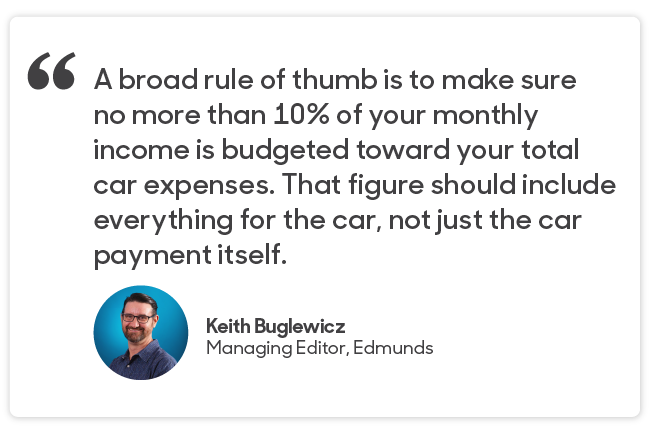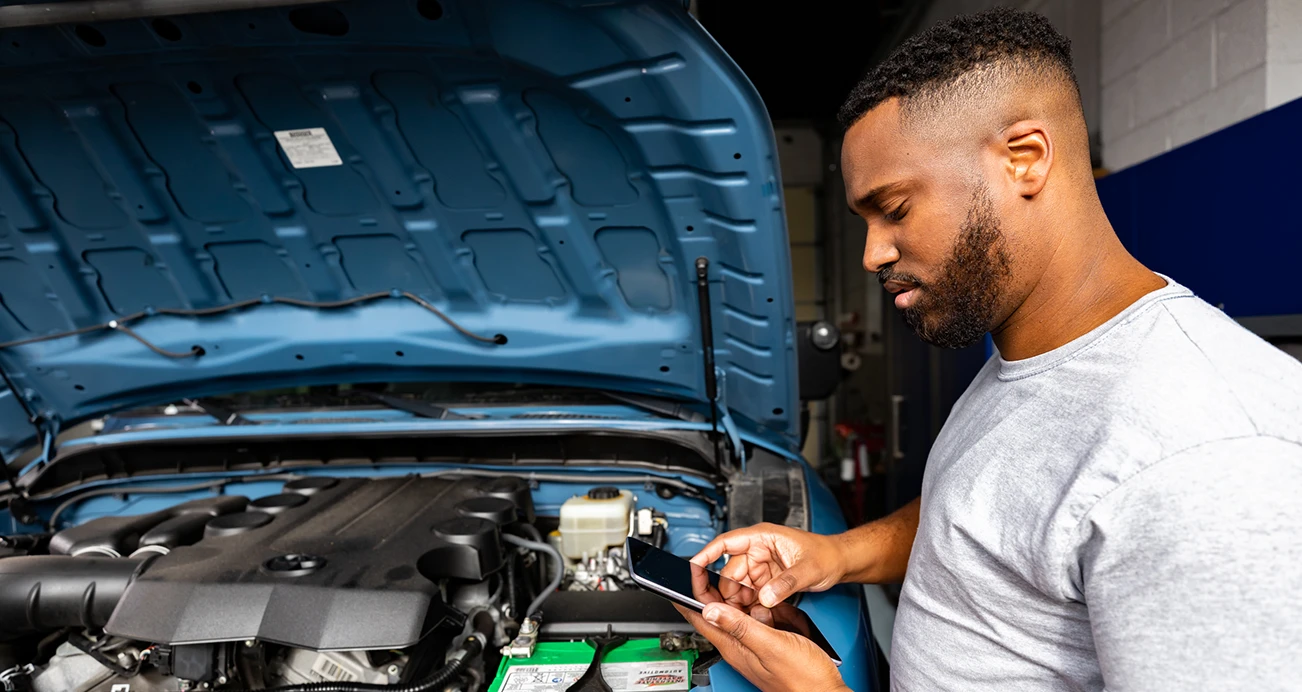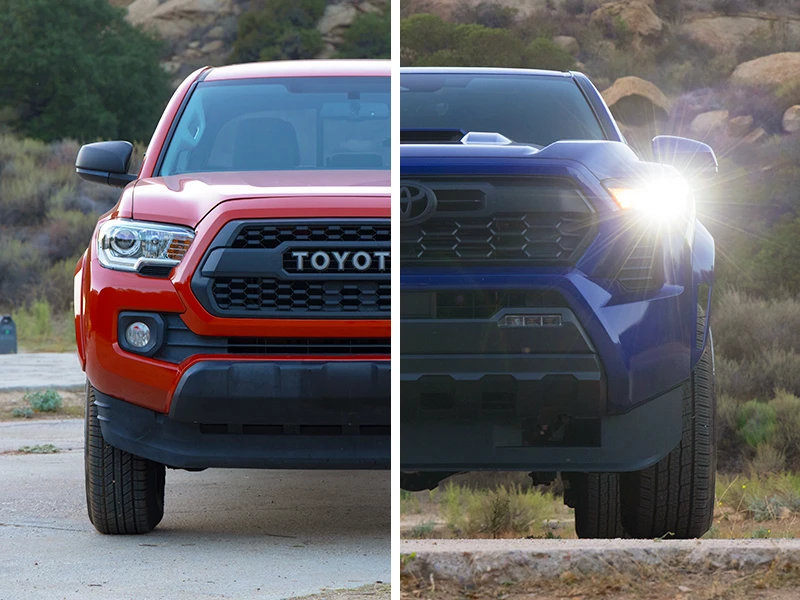
Avoid common mistakes the first time you finance a car.
With thousands of vehicles in our inventory, we’re here to help make car research easier for you. We’ve partnered with car-review experts from Edmunds to weigh in on what matters most when you’re looking to buy a truck or car.
***
So you finally landed that new job, got that promotion, or won just enough in the lottery to let you consider upgrading your car to something a little newer. Maybe you're even thinking of splurging a bit and getting that car you've been dreaming of since you first got your license.
Even if you're not a first-time car buyer, this might be the first time you're exploring the world of car financing. Getting an auto loan instead of paying cash is a big step, with a lot of unknowns. Whether that car loan is for a used car or a new car, you may be wondering how much you can afford, whether that dream car is really within reach, and what other expenses you'll be racking up.
It's a lot to think about, but don't worry: We've got five simple guideposts to help you finance first-timers get your budget and car selection in order on the journey to your dream car. First, let's cover the basics.
What is Financing a Car?
Have you ever used a credit card to buy something you didn’t quite have the cash for and then paid it off over time? Guess what, you've already financed something!
Financing is simply paying for something in installments over a fixed period of time. Cars usually cost more money than we have just lying around. So, instead of paying out-of-pocket for this big-ticket item, you'll work with a lender or broker—which could be a bank, a credit union, or the dealership itself—to break that cost into smaller monthly payments.
Here's a basic example of how car financing works. Let's say the right used car for you is an electric vehicle that costs $40,000, which is quite a bit more than the $8,000 you have saved up. Working with a lender, you can use that $8,000 as a down payment, and the lender will cover the remaining $32,000. Over the course of the next few years you'll make a monthly payment to the lender, slowly paying off the auto loan. In order to make money, the lender charges a percentage of the price of the car, known as an interest rate. Your loan terms will spell out the length of time you have to repay the loan, the annual percentage rate of interest on the loan, and other features of your loan. Once you've paid off the loan in its entirety, the car is officially yours.
To get the best possible loan terms, before you even apply for an auto loan you should check your credit rating. So it's time for step one of financing a car for the first time.
Step 1: Check Your Credit

Anytime you finance something, your credit score is a major factor in getting a loan. Credit agencies look at how well you pay back credit cards, how much total credit you have, how much of your credit you're using, and more, ultimately producing a number between 300 and 850 called a credit score. The higher the number, the better.
This score is used by banks, credit unions, dealership financing arms, and other lenders to determine how much of a risk it is to lend money to you. The higher the number, the less of a risk you are and the lower your interest rate. A lower interest rate on your loan terms means lower monthly payments when you're financing a car, so you're going to want the best credit score you can manage. If your credit score is too low, you may not be able to get a loan at all.
You can get a free credit report, which will list several things about your payment and credit history. For our purposes, the most important is the credit score, and if yours is 781 or higher, good news! You already have excellent credit and won't have to worry about paying an outsized annual percentage rate on your car loan. Even if it's above 661, your credit score is good enough that you're unlikely to be charged an exorbitant interest rate.
However, if your credit score is somewhere between 500 and 660, it might be a good idea for you to hold off on getting a car loan to upgrade your vehicle and instead concentrate on upgrading your credit score. Check your report carefully to see if it says you're making late payments, are overextended on your credit cards, or have other problems. Once you address these issues, your credit score will start improving quickly. Of course, improving your credit score helps not just with the car purchase but with any sort of financial decisions you'll be making in your life. As a bonus, you can keep saving for your down payment, which will reduce your loan amount and your monthly payments once you actually get that auto loan.
If your score is below 500, you should probably hold off even longer on auto financing, and maybe seek out some credit counseling services to help you get your credit back on track. In the long run, driving your old car a bit longer while you repair your credit score will pay off. If the need is more urgent—maybe ol' reliable isn't quite as reliable as it used to be—finding someone with good credit to act as a co-signer on your loan can keep your interest rate down.
Once you know your credit score, you can get preapproved for a loan by a dealership, bank, or credit union. A preapproval lets you know what your interest rate and monthly payment are likely to be ahead of time, to help you fine-tune your budget before committing to a loan.
Step 2: Find Your Right Car

Once your credit score is in good shape, it's time to start looking for a car. This is supposed to be the fun part, but with so many different vehicles, brands, and body styles to choose from, it can be overwhelming.
If you're feeling overwhelmed, it's a good idea to take a step back and think hard about what kind of car will fit best with your lifestyle. For example, influencers can make "overlanding" sound super fun as they traverse untamed wilderness in their off-road beasts. Who doesn't like the great outdoors?
But the reality is that off-road vehicles like a Jeep Wrangler or Toyota 4Runner tend to be expensive, only so-so when it comes to fuel economy, and a bit of a hassle to drive in the city due to their size. Unless you're already an off-road enthusiast, it might be worth considering something a little less hardcore to scratch that off-road itch. Instead of the Wrangler, a Jeep Cherokee offers up decent "soft roading" if you like camping on the weekends. It also offers some practical benefits, like good cargo space, better maneuverability, and better estimated fuel economy.
So remember the realities of your day to day life, and make the right decision for your lifestyle. If you’re still having trouble deciding, don't worry, we have a handy guide that can help you out.
Step 3: Create a Monthly Budget
Since you're going to be making a monthly payment, you need to know how much per month you can afford. A broad rule of thumb is to make sure no more than 10% of your monthly income is budgeted toward your total car expenses. That figure should include everything for the car, not just the car payment itself.
So what else is there? Fuel is a top consideration of course, and if you currently have a car you've probably already budgeted for this expense. But it's important to factor in any changes to your gasoline bill if, for example, you're ditching your Toyota Prius for a Chevy Tahoe.
You should also plan for maintenance. Granted, maintenance costs vary from vehicle to vehicle, but it's important to set a little aside for those oil changes, tires, and other wear items. According to the federal Office of Energy Efficiency and Renewable Energy, maintenance for gas-powered cars costs about 10 cents per mile, while upkeep for electric cars cost about 6 cents per mile. So if you drive 800 miles a month, you should set aside about $80 per month, or $50 if you’re driving an EV. That sounds like more than you'll need, but remember that you're setting that aside for those inevitable big-ticket items, like new tires or larger scheduled maintenance milestones.
There's also insurance, which is its own can of worms we'll get to later.

Also, remember that 10% figure is a guideline, not a hard-and-fast rule. For example, if you have big credit card bills, high rent, or other large fixed payments elsewhere, you might have to lower that figure a bit. On the other hand, if you're already living frugally, maybe you can splurge a bit more on your monthly payment.
Step 4: Consider Reliability and Extended Service Plans

Lemons are great … as long as you're making lemonade or cooking fish. When it comes to cars, everyone wants to avoid lemons. After all, what's the point of having a car you can't drive because it's always in the shop?
There are a couple of ways to make sure you spend more time behind the wheel than in the service department. First, you can research reliability scores for vehicles you're considering and read owner reviews to see if they mention common issues. But, especially if you're shopping used, every vehicle will be a little different based on how it's been maintained. Also, reliability scores aren't written by psychics, and they can't tell you with 100% certainty what to expect from your car.
What if you're still concerned about unexpected costs or you're looking at a car that has an uncertain maintenance history or a brand with a less-than-stellar reliability score? Consider purchasing an extended service plan along with your vehicle, especially if the original factory warranty has expired. An extended service plan, or ESP, is different from the original factory warranty because it's an add-on purchase, not something that comes with the car.
How much does an ESP cost? It depends on what you get. Some extended service plans only cover big-ticket items, such as the engine, transmission, and so on. These tend to be less expensive but also more restrictive, and if anything breaks that's not on the list of covered items, you're paying out of pocket. On the other hand, there are more comprehensive bumper-to-bumper plans that cover just about everything. Not surprisingly, they cost more.
If you're going to get an ESP, make sure to tailor it to your own comfort levels. If you're buying a brand that's known for being reliable, a "big ticket item" warranty might make more sense, just to cover yourself in case something expensive unexpectedly goes kablooie. If you're looking at brands that have a less certain reputation, consider making the stretch to a more comprehensive ESP. The good news is that ESPs don't have to be an added upfront cost. They're usually offered by the dealership at the time of purchase and can be bundled into your auto loan. There are also independent companies that sell extended service plans for a monthly payment.
Step 5: Plan for Insurance
You already know that if you drive a car, you need to have insurance. What you might not realize is that if you're financing a car, you might have to carry more insurance than you're accustomed to. The most basic form of required insurance is liability insurance, which will pay for repairs or medical bills for other people if it's determined you are at fault in an accident. It doesn't pay expenses for you or your car.
When you finance a car, the lender technically owns it until you've paid off the entire loan amount through your monthly payments. Since the lender owns it, it wants to protect its asset, so it requires more than just state-mandated liability insurance.
First, the lender will require you to carry collision insurance. This is pretty self-explanatory, and it covers repairs and other expenses to your car in case of a crash regardless of who's at fault. It'll also require something called comprehensive insurance. This covers pretty much anything else, such as vandalism, damage from a storm, theft, or even a run-in with an animal. On top of all that, you might have to have a higher limit on your liability insurance as well.
It all adds up, and it can be significantly more expensive than what you're used to, especially if your driving record reflects a ticket or two, or an accident.
Once you've picked the kind of car you'd like to buy, you can contact your insurance provider, or get a quote from a new provider, to find out how much insuring your vehicle will cost.
Edmunds Says
We'll admit financial prudence and fiscal responsibility are a little dull, sort of like the "eat your vegetables" part of car ownership. But just like a healthy diet helps you feel better in the long run, being prepared before you buy can keep your finances healthy, and let you drive off in your dream car.




